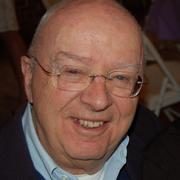Part 2: Two Teachers Appear

Living simply was important for both Frank and Ruth. Choosing to have a smaller home and to drive an older car, and by being generally detached from “things,” allowed a rich space to emerge from which they could give. Together they raised their three children to follow their lead. Frank related the following story about his old Dodge Omni: “I once picked up an executive from the airport, who asked me upon getting into my old car, ‘Is your other car in the shop?’ Much to the wealthy man’s surprise, Frank replied with a smile, “No, this is our only car.”
As CEO of Eastman Gelatin Corporation, a subsidiary of Eastman Kodak, Frank managed a business of 60 million in sales per year. He found himself, after a great deal of hard work and diligent dedication, a wealthy and influential man. He also considered himself blessed when two great teachers appeared in his life: Gordon Cosby and Don McClanen. Gordon was the founder of Washington DC’s Church of the Saviour, an inner-city church that focused on building intentional small group ministries that would work to meet the needs of the community around them. Don was the founder, and executive director, of the non-profit Ministry of Money, which later became our own Faith and Money Network.
In the mid-1960s, Frank attended a conference by the New England Evangelistic Association, where he first heard Gordon speak, finding his candor to be rare, disarming, and attractive. “Gordon,” Frank said, “inspired me to know more about how to give of myself and to live a more deeply faithful life.” Soon after that conference, Frank visited Dayspring, The Church of the Saviour’s retreat center near DC. The integrity of the small group mission model of accountability and shared resources, that Gordon and his community developed, moved Frank so much that he kept in close touch with them over the following years. That relationship helped further shape his attitude towards radical financial stewardship.
Frank and Ruth were supporters of Sojourners, and religiously read their magazine. It was in a Sojourners article, in the mid-1980s, where they read an ad for the Ministry of Money that wanted to connect with wealthy and influential people who might be interested in taking a “Trip of Perspective.” This program would connect the “haves and have-nots” by building bridges of relationships that could help change the financial balance of power in the world. With this divine nudge, Frank called Don McClanen and after an hour of conversation and a subsequent DC visit with him and his wife Gloria, a transformational relationship was born. Frank joined the board of Ministry of Money, regularly leading workshops and trips of perspective, as well as helping people make the connection between their relationship with money and their faith. Frank credits Gordon and Don for his proclivity towards lavish giving.
From the ever-deepening commitment to seek his true self, Frank pushed against the cultural tide of scarcity that says “you don’t yet have enough,” saying instead, “How much can I give away?” He and Ruth found solace in turning their money “upside down.” This reverse form of tithing would have them give 90% of their money away, keeping 10% for themselves. They set out to do this when Frank began earning more than they needed. Shyly, Frank confessed that they didn’t quite make it. “It was our goal to do it, but we were only able to get down to giving away two-thirds of our income.” I laughed and said, “Frank! Who does that today?!?” He laughed too, and then said, “Money was never a restraint to us. We felt such freedom around it all.” At first, their giving was done through their church, but when the giving went beyond that first 10%, they reached out to the greater world.
I couldn’t let Frank go without asking him what advice he would give to us regarding money and how we use it. “Well,” he said, “Jesus talked more about money and possessions than any other topic than the Kingdom of God. Yet it doesn’t imply that there’s only one answer. A canned answer would not be helpful.” He added, “You have to have your priorities straight. You need to tithe, practice a discipline of some kind, and have a support group as you’re trying to live counter-culturally. Engaging people about their priorities is crucial.”
My friends were right. Frank Butler is a saint. A tangible, human saint. And one worth emulating.
Jim Marsh, Jr., Bread of Life Church
Board member of Faith and Money Network